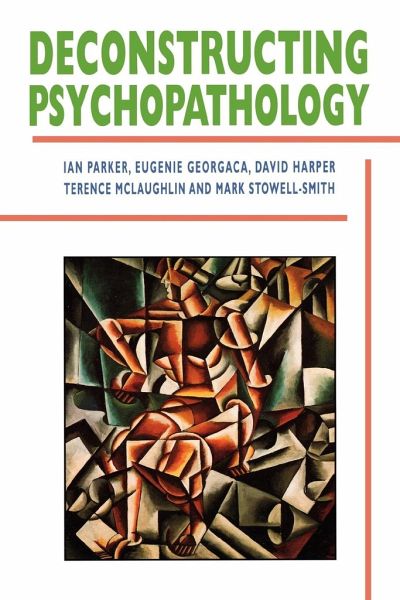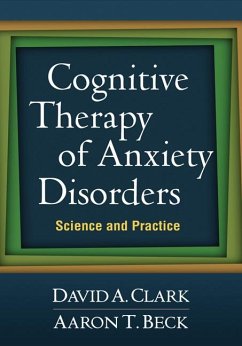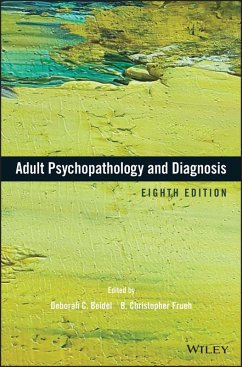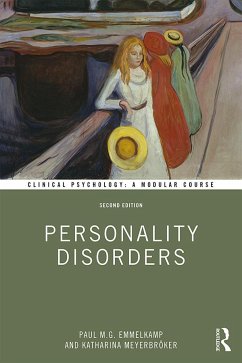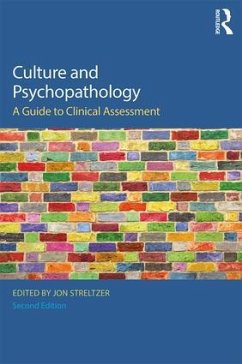Deconstructing Psychopathology
Versandkostenfrei!
Versandfertig in 1-2 Wochen
Weitere Ausgaben:

PAYBACK Punkte
34 °P sammeln!





Serves as a critique of the institutions and presuppositions that underlie the study of 'psychopathology'. This book is useful for students and practitioners who are working to understand mental health and distress. It analyzes the notion of 'psychopathology' as a conventional term in psychology through the language which holds it in place.
Ian Parker is Professor of Psychology in the Discourse Unit at Bolton Institute. He is author of Psychoanalytic Culture (SAGE, 1997) and co-author of Deconstructing Psychopathology (SAGE, 1995). CONTRIBUTORS Steven D Brown Keele University Vivien Burr University of Huddersfield Andrew Collier University of Southampton Bronwyn Davies James Cook University Don Foster University of Cape Town Kenneth J Gergen Swarthmore College Rom Harre Oxford University Maritza Montero Universidad Central de Venezuela Jonathan Potter Loughborough University Joan Pujol University of Huddersfield Carla Willig Middlesex University
Produktdetails
- Verlag: SAGE Publications Inc
- Seitenzahl: 180
- Erscheinungstermin: 21. November 1995
- Englisch
- Abmessung: 234mm x 156mm x 10mm
- Gewicht: 282g
- ISBN-13: 9780803974814
- ISBN-10: 0803974817
- Artikelnr.: 21822325
Herstellerkennzeichnung
Libri GmbH
Europaallee 1
36244 Bad Hersfeld
gpsr@libri.de
`Fast becoming a contemporary classic... this book tries both to be critical and engender critical thinking in a number of ways. It offers an overview of a number of theories that address human distress as well as particular forms of "pathology". This book effectively highlights the way that western society has taken "normal"; and "abnormal" emotional states to be factual entities rather than the constructed understandings of human phenomena that they are.... should be on the reading list of every course/module that attends to human distress' - Journal of the Society for Existential Analysis `I find this one of the most reasonable and persuasive analyses of this complex and fraught area. The final chapter includes a list of 28 journals and
Mehr anzeigen
organizations considered to have a more enlightened view of mental health issues. There are also many valuable references' - British Journal of Medical Psychology `The role of power relations and how these relations are reflected in our language and practices cannot be ignored... I find this book provocative as well as readable... the discursive method surely leads to reflections that I would not like to be without as a researcher and clinician... Given the increasing use of diagnoses in mental health care and the biological language often used in psychiatry, I consider this book an important contribution to our understanding of psychopathology' - Clinical Psychology and Psychotherapy `This is an extremely timely book, essential reading for all those disturbed by the surreptitious colonisation of the human potential field by anti-humanistic philosophies and practices. Drawing upon Foucault, the book "deconstructs" the language and institutions that hold the notion of "psychopathology" in place, subjecting it to an unrelenting philosophical critique and proposing alternative, philosophically sustainable and more democratic and human(e) ways of conceptualizing emotional and "mental" suffering... this book lays bare the fundamental ideological basis of the psychopathologising mentality. If you are open to questioning at root the philosophical assumptions underlying, and often unconsciously "constructing", your own therapeutic practice, then you will surely find Deconstructing Psychopathology one of the most important books to appear in years. I unreservedly recommend it' - Self & Society `Although there has been a good deal of critical writing on various aspects of "psychopathology" in the last few years, this is the first book which attempts a general deconstruction of the area. The authors therefore faced a formidable task not only in setting out the complex theoretical frameworks necessary for this task, but also in covering a wide enough area to show their general applicability and relevance... the authors have put a prodigious amount of information and ideas [into this book]... The main premises are that, far from discovering and cataloguing mental disorders which exist "out there"... psychologists and psychiatrists construct psychopathology using a language surrounded by assumptions and values which are rarely made explicit or subjected to critical scrutiny... Throughout, the authors emphasize the interdependence of language, knowledge and power, and the importance of focusing on the professionals themselves as well as on those who are the usual subjects of our theories and practices. Given the scope of the task and the relative brevity of the book, the authors succeed very well indeed in conveying both the scale of the problem and the importance of an analysis in which language is central. One of the strengths of this book is the wealth of material and analysis contained in each chapter... this book is to be highly recommended. It is, above all, thought-provoking. It challenges professionals to abandon the idea that they are neutrally "doing science" and urges them to be as willing to make themselves objects of study as they are their clients. It is not a comfortable book to read: it is not, after all, flattering to be asked to see oneself as part of the problem and not as part of the solution. The book... emphasizes the urgent need for debate about some of the questions' - Behaviour Research and Therapy `The impassioned intentions of the five authors have led them to write this text, which demonstrates a benign concern for those who are construed as having "psychopathology"... I welcomed the list of user-friendly groups and I loved the material on the Hearing Voices Network' - Medical Sociology News `An excellent introduction to the relevance of the works of Derrida and Foucault to the field of psychopathology. In addition, there are thumbnail sketches of Laingian antipsychiatry, noting the real although neglected place of David Cooper. Equally helpful are the pieces on cognitive therapies and on family therapies. The Hearing Voices movement founded by Marius Romme is so rightly extolled... this book has almost taught this old dog some new tricks and I strongly recommend it to others... the seriousness is admirable and the erudition striking... an excellent contribution' - History and Philosophy of Psychology Newsletter `For those working in mental health services who are not used to an approach based loosely on Foucault and Derrida this is undoubtedly a good starting point. My guess is that it would unnerve any reader with a naive realist perspective on "mental illness" in a thought-provoking way... The book provides a welcomed critical reading of psychiatric diagnosis and diagnoses, and offers the uninitiated reader a canter through the resources (research and practical projects) which have provided a set of alternatives or oppositions to orthodoxy in the mental health industry. Chapters... carry out this summary well and... are reason enough to encourage all those interested in the current politics of mental health to have the book on their shelves... it is genuinely politically concerned about people with mental health problems' - Disability & Society `These essays are well-researched, professional articles. They are written by and for psychotherapists, psychologists, psychiatrists and educators already familiar with the "narrative" turn in therapy, and already disposed to take a sociological approach' - Mentalhelp
Schließen
Für dieses Produkt wurde noch keine Bewertung abgegeben. Wir würden uns sehr freuen, wenn du die erste Bewertung schreibst!
Eine Bewertung schreiben
Eine Bewertung schreiben
Andere Kunden interessierten sich für




